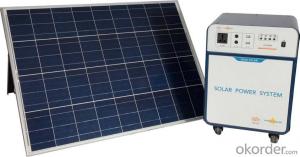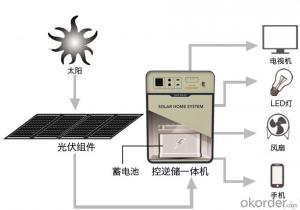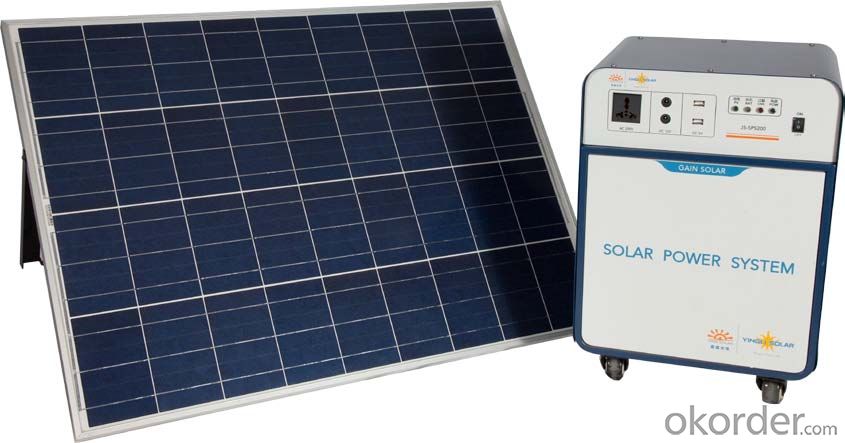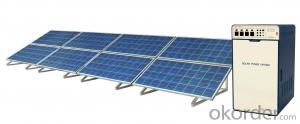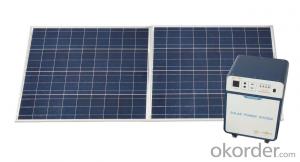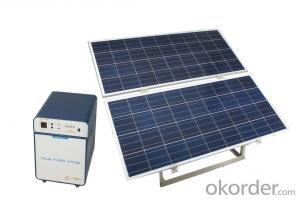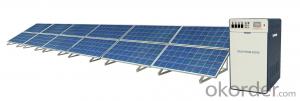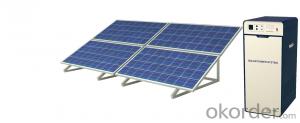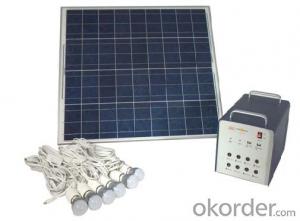Solar Energy Systems Carlisle JS-SPS-200 Off-Grid Solar Power System
- Loading Port:
- Tianjin
- Payment Terms:
- TT OR LC
- Min Order Qty:
- 10 set
- Supply Capability:
- 10000 set/month
OKorder Service Pledge
OKorder Financial Service
You Might Also Like
General Introduction
Solar power system provides alternating current and direct current, which is produced by the modules transforming solar power into power, to home lighting, household appliance and other DC appliance, such as cell phone and laptop.
Solar power system is widely used in area lack of power, for example house power supplying, monitoring, communication base, fire prevention in forest area, pasture and meadow, aquaculture etc.
We are dedicated to provide high quality off-grid PV products and systems to customers and has received a series of certificate, including ISO9001, TUV, UL, CE, CQC and RoHS.
Off-grid Solar Power System
High efficent PV module can produce more power.
Sine wave output is suitable for all kinds of load. Varieties of DC output, let it more
convenient for users.
The multifunction design make it easy to operation and maintenance.
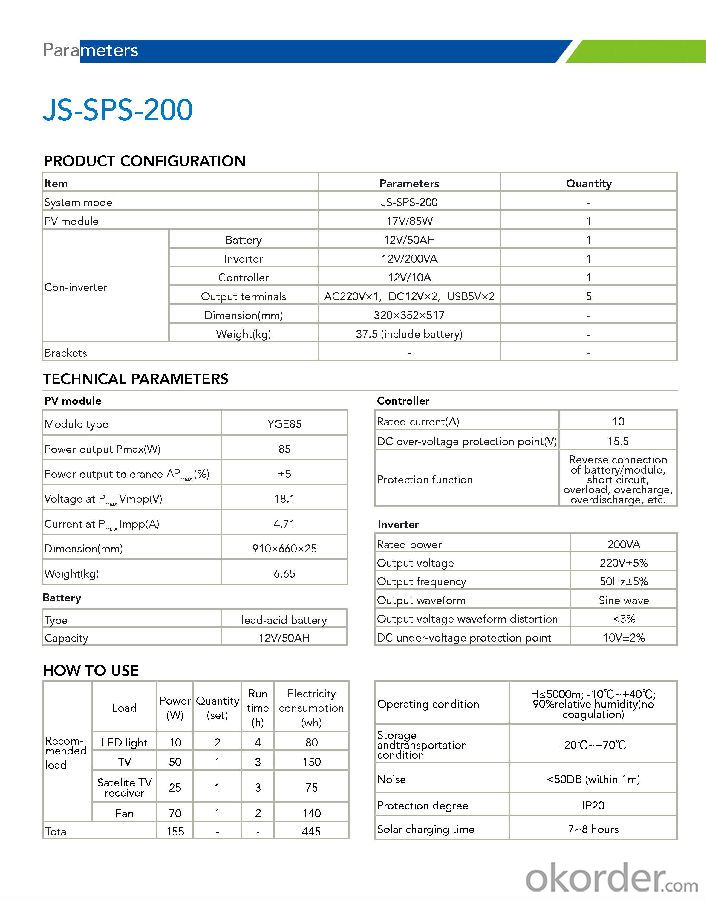
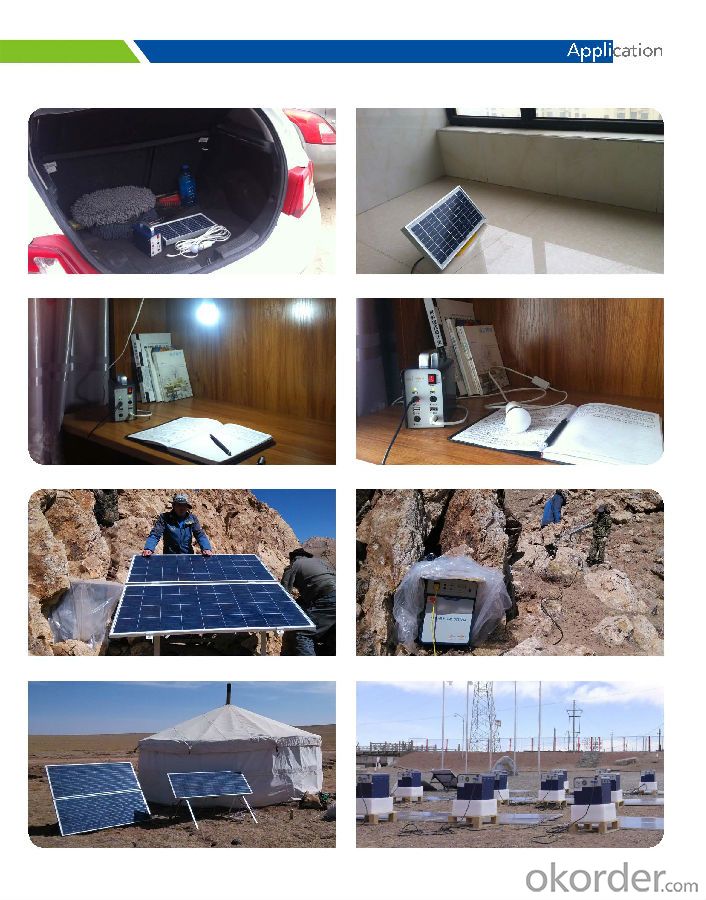
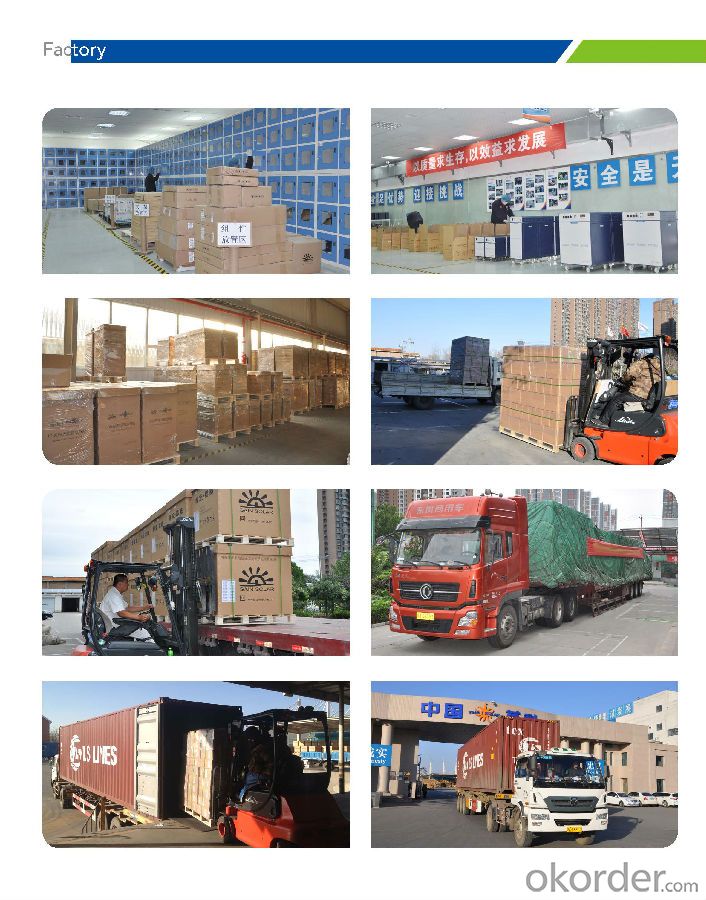
- Q: How do solar energy systems affect the demand for traditional energy sources?
- Solar energy systems have a significant impact on the demand for traditional energy sources. By harnessing sunlight to generate electricity, solar energy systems reduce the reliance on fossil fuels such as coal, oil, and natural gas. This reduction in demand for traditional energy sources helps to decrease the overall consumption of these finite resources, leading to a more sustainable and environmentally friendly energy sector.
- Q: Are there any risks of electromagnetic radiation with solar energy systems?
- Solar energy systems have potential risks related to electromagnetic radiation. These systems utilize photovoltaic panels to convert sunlight into electricity. The panels produce direct current (DC) electricity, which is then changed to alternating current (AC) electricity for use in homes and businesses. One potential source of electromagnetic radiation is the inverter, responsible for converting DC electricity to AC electricity. In some cases, these inverters may generate electromagnetic fields (EMFs) that emit low-frequency radiation. Although these EMFs are generally considered low and within acceptable limits, ongoing research aims to better understand any potential health effects from long-term exposure to these fields. Another risk involves high-frequency electromagnetic radiation from radio frequency (RF) communication devices, like wireless monitoring systems or communication modules used in solar energy systems. These devices wirelessly transmit and receive signals, causing concern about potential health effects from long-term RF radiation exposure. However, these devices typically have low power levels and are designed to comply with safety standards and regulations. It's important to note that the risks associated with electromagnetic radiation from solar energy systems are generally considered low compared to other everyday sources, such as cell phones, Wi-Fi routers, or power lines. Nonetheless, it is always advisable to follow safety guidelines provided by manufacturers and industry standards to minimize potential risks.
- Q: Can solar energy systems be leased or rented?
- Yes, solar energy systems can be leased or rented. Many companies offer leasing or rental options for solar panels and systems, allowing individuals and businesses to access the benefits of solar energy without the upfront costs of purchasing and installing the equipment.
- Q: Can solar energy systems be used for emergency response operations?
- Yes, solar energy systems can be used for emergency response operations. Solar power provides a reliable and sustainable source of energy that can be used to power essential equipment and infrastructure during emergencies. It can be used to charge batteries, run communication systems, provide lighting, and power medical equipment in remote or disaster-stricken areas where there may be limited access to electricity. Solar energy systems are versatile, easy to deploy, and can help ensure the continuity of critical services during emergency situations.
- Q: Can solar energy systems be used in areas with high levels of noise pollution?
- Yes, solar energy systems can be used in areas with high levels of noise pollution. Solar panels do not produce any noise themselves, as they generate electricity by converting sunlight into energy. Therefore, noise pollution does not affect the performance or functionality of solar energy systems.
- Q: What is a photovoltaic solar energy system?
- A photovoltaic solar energy system is a type of renewable energy system that converts sunlight into electricity. It involves the use of solar panels, which are made up of numerous solar cells. These solar cells are comprised of semiconductors, typically made of silicon, that absorb photons from sunlight. When sunlight hits the solar panels, the photons transfer their energy to the electrons in the semiconductors, causing them to become energized and generate an electric current. This direct current (DC) is then converted into alternating current (AC) through an inverter, making it suitable for usage in homes, businesses, or the electrical grid. The main components of a photovoltaic solar energy system include the solar panels, which are usually mounted on rooftops or in open areas to maximize exposure to sunlight. There are also different types of solar panel technologies, such as monocrystalline, polycrystalline, or thin-film, each with its own efficiency levels and costs. To ensure maximum efficiency, solar panels are often positioned at an optimal angle and direction to capture as much sunlight as possible throughout the day. Additionally, inverters are used to convert the generated DC electricity into AC electricity, which is the standard form of electricity used in most electrical appliances and devices. Photovoltaic solar energy systems have numerous advantages, including environmental benefits as they produce clean and renewable energy, reducing greenhouse gas emissions. They also offer potential cost savings by reducing or eliminating reliance on traditional energy sources. Furthermore, they require minimal maintenance and have a long lifespan, typically ranging from 25 to 30 years. Overall, a photovoltaic solar energy system harnesses the power of the sun to produce electricity, providing a sustainable and environmentally friendly alternative to conventional energy sources.
- Q: How much space do I need for a solar energy system?
- The amount of space needed for a solar energy system depends on various factors such as the size and efficiency of the solar panels, the electricity consumption of the household, and the geographical location. On average, a residential solar system requires around 100-400 square feet of unobstructed roof space per kilowatt of installed capacity. It is best to consult with a professional solar installer who can assess your specific needs and provide accurate space requirements for your solar energy system.
- Q: What is the payback period for installing a solar energy system?
- The payback period for installing a solar energy system depends on various factors such as the initial cost of the system, the amount of energy it can generate, and the local electricity rates. On average, a solar energy system can have a payback period of around 5 to 15 years. However, with government incentives, tax credits, and decreasing installation costs, the payback period for solar energy systems has been reducing, making it a more financially viable option for homeowners and businesses.
- Q: Can solar energy systems be used for powering off-grid construction sites?
- Yes, solar energy systems can be used to power off-grid construction sites. These systems can provide a reliable and sustainable source of electricity for various construction activities, including powering tools, equipment, lighting, and temporary facilities. Solar panels can be installed on-site to harness sunlight and convert it into electricity, which can then be stored in batteries for use during non-sunlight hours. This allows construction sites to operate efficiently and reduce their reliance on traditional fuel-powered generators, leading to cost savings and environmental benefits.
- Q: Are solar energy systems suitable for all locations?
- No, solar energy systems are not suitable for all locations. The feasibility and efficiency of solar energy depend on various factors such as the amount of sunlight received, the availability of space for installing panels, and the local climate. Regions with low sunlight or frequent cloudy weather may not be ideal for solar energy systems. Additionally, areas with limited space or high levels of shading may also face challenges in harnessing solar power effectively.
Send your message to us
Solar Energy Systems Carlisle JS-SPS-200 Off-Grid Solar Power System
- Loading Port:
- Tianjin
- Payment Terms:
- TT OR LC
- Min Order Qty:
- 10 set
- Supply Capability:
- 10000 set/month
OKorder Service Pledge
OKorder Financial Service
Similar products
Hot products
Hot Searches
Related keywords
